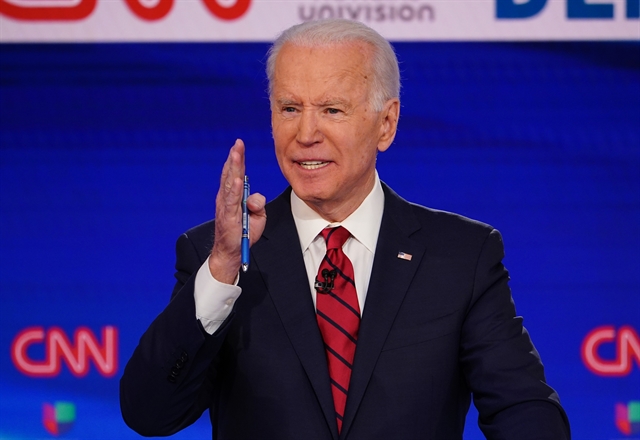 World
World


|
| Democratic presidential hopeful former US vice president Joe Biden participates in the 11th Democratic Party 2020 presidential debate in a CNN Washington Bureau studio in Washington, DC. Joe Biden easily won the Florida and Illionois primaries over Bernie Sanders, widening his lead in the race for the Democratic presidential nomination. — AFP/VNA Photo |
MIAMI — Joe Biden cemented his status as the likely Democratic presidential nominee on Tuesday after trouncing Bernie Sanders in Florida and Illinois, the top prizes on a busy primary night blighted by the coronavirus pandemic.
The substantial margin of projected victory in the two states speaks to the speed with which many Democrats have begun coalescing around a potential flagbearer just one month after the former vice president's campaign was struggling badly against a surging Sanders.
Following a string of victories in high-profile contests and his show of strength on Tuesday, the moderate Biden has now crossed the halfway point in terms of earning a majority of delegates needed to become the nominee.
With almost all Florida precincts reporting, the 77-year-old Biden led 62 per cent to 23 per cent against Sanders, a 78-year-old leftist senator from Vermont.
In Illinois, Biden was ahead 59 per cent to 36 per cent, with 58 per cent of precincts reporting.
"Our campaign has had a very good night," Biden said in televised remarks from his home in Delaware.
"We've moved closer to securing the Democratic Party's nomination for president, and we're doing it by building a broad coalition that we need to win in November."
Biden has long said that Americans do not want Sanders's political "revolution," they want results.
But he extended an olive branch Tuesday by appealing to Sanders supporters.
"To young voters who have been inspired by Senator Sanders 'I hear you,'" Biden said.
Biden said he and Sanders "share a common vision" to expand health insurance, address economic inequality and fight climate change.
Americans were also voting in Arizona. Biden has led in polling there and is expected to do well.
A Biden trifecta would leave Sanders a gravely wounded candidate, having largely failed to reverse his fortunes after losing 18 of the last 23 contests.
"I think there's going to be enormous pressure for him to call the race, because it's over," Democratic analyst David Axelrod, chief strategist for Barack Obama's two successful presidential campaigns, said on CNN, referring to the likelihood of Sanders dropping out.
Sanders delivered a 20-minute speech online Tuesday. But the democratic socialist did not mention the primaries, focusing instead on his recommendations for addressing the coronavirus crisis, including injecting $2 trillion in funding to prevent deaths and "avoid an economic catastrophe."
A fourth state, Ohio, was scheduled to vote on Tuesday, but it postponed its elections until June on orders of Republican Governor Mike DeWine, who told voters to stay home amid the escalating public health emergency.
That still left a major three-state haul of 441 delegates at stake.
On Tuesday Biden's delegate count stood at 1,121 compared to Sanders's 839, according to a New York Times rolling tally. A candidate needs 1,991 delegates to secure the Democratic nomination and face President Donald Trump in November's election.
Hurdles
The United States officially has more than 5,600 coronavirus cases, although that is believed to be a fraction of the real number, which has been depressed by delays in testing.
Election authorities had braced for disruptions with the Trump administration urging Americans to avoid gatherings of more than 10 people.
Despite hurdles, the states managed to successfully host their primaries.
In Florida, state authorities moved dozens of precincts from senior centres to protect against the virus.
In Illinois, Chicago election commissioners scrambled to find substitute voting judges after hundreds informed the county clerk's office they wouldn't show up.
The Chicago Board of Elections said the coronavirus crisis posed immense challenges, and that turnout was low.
Americans are staying home from work or school by the millions as the country implements emergency measures against a worsening health crisis.
Maryland on Tuesday became the latest state to delay voting, pushing its primary from April 28 to June 2.
Kentucky and Louisiana have postponed their elections to June, while Georgia is delaying from next week until May. — AFP




